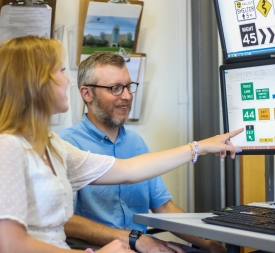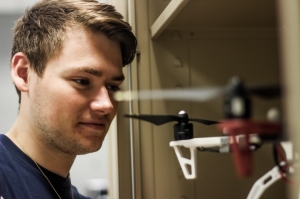Summer Months See In-Person Student Research Return and Flourish on Campus
There are more than 130 student research projects taking place in-person on Villanova’s campus this summer.

Joseph Toscano, PhD, associate professor of Psychological and Brain Sciences, working with Villanova student Maeve Schumacher ’22 College of Liberal Arts and Sciences (CLAS).
When you drive down a highway, do you know what every sign actually means?
That is what Joe Toscano, PhD, associate professor of Psychological and Brain Sciences, and student Maeve Schumacher ’22 College of Liberal Arts and Sciences (CLAS), are hoping to find out. Conducting this research in-person in Toscano’s Word Recognition and Auditory Perception (WRAP) Lab, the two are looking at whether or not people are good at interpreting the sign and what properties of it—its color, shape, text, symbols—matter to understanding the sign.
This is just one of the more than 130 research projects that are taking place in-person on Villanova’s campus this summer. After a year of most in-person student research being placed on pause because of the COVID-19 pandemic—or students and faculty having to collaborate over Zoom—many projects are back in-person as research has resumed. Students are working with faculty in disciplines ranging from the sciences and humanities to business and engineering—studying everything from how the pandemic affected homeless shelter staff to how wind affects ant behavior.
“The pandemic had an enormous impact on a variety of research activities, in many cases bringing research to a complete stop," said Amanda Grannas, PhD, Vice Provost for Research and Chief Research Officer. "Our Villanova faculty are so committed to providing valuable mentorship to students interested in doing research—and were so creative to find ways to do that, even in the midst of a global pandemic. While everyone was immensely resilient and adaptable to work to redesign their projects to accommodate a remote world, nothing truly replaces that side-by-side learning and discovery that comes with in-person research. It’s so exciting to see the diversity of projects happening now, across a variety of disciplines all around campus and beyond.”
Of the 130-plus students doing research on-campus, a number are part of the Villanova Undergraduate Research Fellows (VURF). In this program, students are paired with a faculty mentor for their research and, through the University, receive a stipend and funding for supplies, travel and conferences.
"We are extremely proud of Villanova’s undergraduate researchers and how they quickly pivoted to remote research during Summer 2020," said Catherine Stecyk, Associate Director of the Center for Research and Fellowships. "They worked with their mentors, modified proposals, and committed themselves to a summer of scholarship and discovery. We saw that same enthusiasm in Summer 2021, with most of the Villanova Undergraduate Research Fellowship (VURF) cohort implementing their student-driven research projects on campus."

Evan Bowers ’22, Mechanical Engineering
Evan Bowers ’22, Mechanical Engineering, whose mentor this summer is C. Nataraj, PhD, Professor of Mechanical Engineering, is a VURF recipient and is working on computer-based modeling of cracked rotating systems and what to do when it occurs. For example, they can use the model to determine a helicopter blades’ breaking point and when, or if, it will need to be replaced. Bowers says the in-person collaboration with faculty is paying dividends.
“Researching with Dr. Nataraj has provided me with fantastic coding experience that I never would have had the ability to gain on my own,” Bowers said. “Research is teaching me more than just information about the problem at hand, it is honing skills that I will one day need when I leave Villanova.”
Faculty are seeing the same benefit of being back together.
“The networking and informal interactions that students get when they are together in the lab was lost last year and it is such an important part of their professional development experience,” said Toscano. “Most of our research is in-person and we need to be in the lab to collect the data. It’s been refreshing to be face-to-face to answer their questions and more hands-on to enhance their learning experience.”
